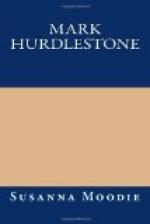And all around, on the dewy
ground,
The
quivering moonbeams stray;
And
the light and shade,
By
the branches made,
Give motion and
life to the silent glade,
Like fairy elves
at play.
And far o’er the meads,
through its fringe of reeds,
Flashes
the slender rill;
Like
a silver thread,
By
some spirit led,
From an urn of
light by the moonbeams fed,
It winds round
the distant hill.
When sleep’s soft thrall
falls light on all,
That
lady’s eyes unclose;
To
all that is fair
In
earth and air,
When none are
awake her thoughts to share,
Or her spirit
discompose.
And tones more dear, to her
fine-tuned ear,
On
the midnight breezes float;
Than
the sounds that ring
From
the minstrel’s string,
When the mighty
deeds of some warrior king
Inspire each thrilling
note.
* * * * *
“So there’s a hole in the ballad,” said the old tar, looking up in his daughter’s blushing face. “Julee, my dear, what does all this mean?”
“It would be a difficult matter for Miss Julee to explain,” said Aunt Dorothy.
Further remarks on either side were stopped by the announcement of Colonel Hurdlestone, and his son and nephew. Juliet seized the portfolio from her father, and, with one bound, cleared the opposite doorway, and disappeared.
“We have frightened your daughter away, Captain Whitmore,” said the Colonel, glancing after the retreating figure of Juliet. “What made my young friend run from us?”
“Oh, I have just found out the saucy jade is scribbling verses all over my paper; and she is afraid that I should tell you about it; and that aunt Dorothy would quiz her before these gentlemen.”
“I should like much to see a specimen of her poetry,” said the Colonel.
“Here are a few lines addressed to myself,” said the proud father, handing them to his friend. “I was going to scold Julee for her folly; but, by Jove, Colonel, I could not bring my heart to do it after reading that!”
The paper went round. It lingered longest in the hand of Anthony Hurdlestone. The lines possessed no particular merit. They were tender and affectionate, true to nature and nature’s simplicity, and as he read and re-read them, it seemed as if the spirit of the author was in unison with his own. “Happy girl!” he thought, “who can thus feel towards and write of a father. How I envy you this blessed, holy affection!” He raised his eyes, and rose up in confusion, to be presented to Miss Whitmore.




